|
|
|
Sort Order |
|
|
|
Items / Page
|
|
|
|
|
|
|
| Srl | Item |
| 1 |
ID:
090784
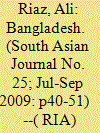

|
|
|
|
|
| Publication |
2009.
|
| Summary/Abstract |
The parliamentary elections of 2008 were held after two years of democratic hiatus, during which time the country was ruled by a military-backed technocratic caretaker regime under a state of emergency.
|
|
|
|
|
|
|
|
|
|
|
|
|
|
|
|
| 2 |
ID:
152950
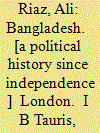

|
|
|
|
|
| Publication |
London, I B Tauris, 2016.
|
| Description |
xvi, 317p.: tables, figures, mapshbk
|
| Standard Number |
9781780767413
|
|
|
|
|
|
|
|
|
|
|
|
Copies: C:1/I:0,R:0,Q:0
Circulation
| Accession# | Call# | Current Location | Status | Policy | Location |
| 059060 | 954.92/RIA 059060 | Main | On Shelf | General | |
|
|
|
|
| 3 |
ID:
061114
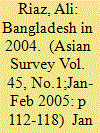

|
|
|
|
|
| Publication |
Jan-Feb 2005.
|
|
|
|
|
|
|
|
|
|
|
|
|
|
|
|
| 4 |
ID:
163210
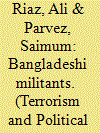

|
|
|
|
|
| Summary/Abstract |
Although militant groups have been present in Bangladesh since the 1990s, the country catapulted to international media attention on July 1, 2016, after an attack on a café in the upscale neighborhood of the capital Dhaka. The Islamic State claimed responsibility for the attack which killed 29 people, mostly foreigners. The attack came in the wake of a series of attacks on religious and ethnic minorities, foreigners, liberal activists, authors, and publishers by both an AQIS affiliate and ISIS. The government denied the existence of militant groups tied to international terrorist organizations. Despite these developments and instances of Bangladeshis joining the ISIS in Iraq and Syria, there has been very little in-depth discussion about who these militants are and what is driving Bangladeshis to militancy. This article addresses this lacuna. This paper examines the common traits of alleged Bangladeshi militants and explores the factors of radicalization. Drawing on media reports of the profiles of the alleged militants, between July 2014 and June 2015, and between July 2016 and August 2017, the article finds that most of the Bangladeshi militants are young, educated males increasingly coming from well-off families. We have also found evidence that four factors—social relationships, use of the Internet, personal crises, and external relations—appear most frequently in the narratives of Bangladeshi
|
|
|
|
|
|
|
|
|
|
|
|
|
|
|
|
| 5 |
ID:
129652
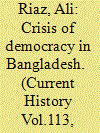

|
|
|
|
|
| Publication |
2014.
|
| Summary/Abstract |
Since its independence in 1971, Bangladesh has experienced tumultuous times. The country endured prolonged military rule from 1975 to 1990, but democratic aspirations have defined the course of its politics. In the past four decades, Bangladesh has experimented with various systems of governance, including one party presidential rule and, currently, a multiparty parliamentary system, having returned to parliamentary democracy in 1991. Bangladesh has demonstrated favorable elements of democracy, such as high levels of political participation, a plethora of political parties, a growing middle class, a vibrant civil society, and periodic elections. Yet the nation has undergone repeated reversals of democratic gains, thanks to civilian authoritarianism and military dictatorship. The polity has suffered from an absence
of strong institutions to ensure the rule of law, accountability, and transparency in governance.
|
|
|
|
|
|
|
|
|
|
|
|
|
|
|
|
| 6 |
ID:
081140


|
|
|
|
|
| Publication |
London, Routledge, 2008.
|
| Description |
xiii, 172p.hbk
|
| Series |
Routledge Contemporary South Asia Series
|
| Standard Number |
9780415451727
|
|
|
|
|
|
|
|
|
|
|
|
Copies: C:1/I:0,R:0,Q:0
Circulation
| Accession# | Call# | Current Location | Status | Policy | Location |
| 053251 | 954.9205/RIA 053251 | Main | On Shelf | General | |
|
|
|
|
| 7 |
ID:
165501
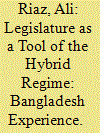

|
|
|
| 8 |
ID:
102755
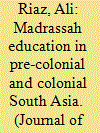

|
|
|
|
|
| Publication |
2011.
|
| Summary/Abstract |
This paper traces the history of madrassahs (Islamic seminaries) in South Asia from their inception in the 12th century until the end of colonial rule in 1947. The paper argues that many of the pre-colonial rulers of South Asia, including the Mughals (1526-1857), played key roles in promoting education and providing patronage of various educational institutions, including madrassahs. The policies of British colonial rule (1757-1947), however, made the most indelible marks on madrassah education, not only directly, wherein their policies have impacted on the structure, functions and curriculum of madrassahs, but also indirectly, through the prompting of responses from the ulama and the Muslim community that determined the contours and the content of madrassah education. The paper examines the roles of various strands of madrassah education, and the interplay of politics and curriculum of various major madrassahs. The paper demonstrates that madrassah as a concept and as an institution has come a long way, that its contents and contours have undergone changes, and that as an institution it has largely remained embedded within the society.
|
|
|
|
|
|
|
|
|
|
|
|
|
|
|
|
| 9 |
ID:
160070
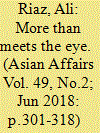

|
|
|
|
|
| Summary/Abstract |
This paper challenges the popular perception that Bangladesh has become the latest battleground between secularism and Islam and problematizes the simplified understanding and the binarization of religion and secularism in Bangladesh. It argues that extant discussions on the one hand overlooks the historical background of the interactions of religion and while on the other hand, it ignores the extant multiplicity of both Islamic practices and the understanding of secularism. The author calls for a nuanced understanding of the complex historical and contemporaneous developments regarding relationships between religion and politics.
|
|
|
|
|
|
|
|
|
|
|
|
|
|
|
|
| 10 |
ID:
125047
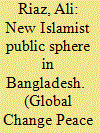

|
|
|
|
|
| Publication |
2013.
|
| Summary/Abstract |
Historically, Bangladesh has a strong and culturally embedded vibrant public sphere. The Bangladeshi public sphere always consists of a multiplicity of publics. The idea of public sphere in Bangladesh was based on the idea of secular rationality or religious neutrality. However, the situation is changing; attempts are being made to create an Islamist public sphere. This paper highlights two examples of this effort to foster the Islamization of the public sphere: production of Islamist fiction and founding women's discussion groups. It argues that the emerging Islamist public sphere in Bangladesh only subscribes to one interpretation of Islam and that the traditional authorities are now being replaced by the Islamist interpretation advanced by ideologues. It further argues that the absence of reference to local syncretistic traditions in the new Islamist discourse makes its authenticity suspect.
|
|
|
|
|
|
|
|
|
|
|
|
|
|
|
|
| 11 |
ID:
101551
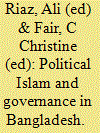

|
|
|
|
|
| Publication |
London, Routledge, 2011.
|
| Description |
xii, 183p.
|
| Series |
Routledge contemporary South Asia series
|
| Standard Number |
9780415576734, hbk
|
|
|
|
|
|
|
|
|
|
|
|
Copies: C:1/I:0,R:0,Q:0
Circulation
| Accession# | Call# | Current Location | Status | Policy | Location |
| 055601 | 320.557095492/RIA 055601 | Main | On Shelf | General | |
|
|
|
|
| 12 |
ID:
076871
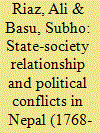

|
|
|
|
|
| Publication |
2007.
|
| Summary/Abstract |
For nearly a decade, from the declaration of Maoist 'people's war' in January 1996 to the formation of new alliance for the restoration of democracy in December 2005, Nepal has experienced a three-way power struggle between Maoist insurgents who want a republic based on egalitarian principles, elected politicians who want an unfettered role in policy making and a monarch bent upon a return to pre-democratic Nepal. This article attempts to explain this crisis from a structural-historical perspective and argues that fundamental to the understanding of this crisis is the state-society relationship. The article contends that the complex use of the constructed Hindu identity to provide cultural legitimacy to the monarchical political order, that has existed since the inception of the state in the 18th century to the democratic revolution in 1990, has contributed to the political alienation of substantial segment of ethnically, socially and economically marginalized population from the Nepalese state. By examining complex interactions among political and economic factors, this article further contends that the unrepresentative process of state formation and the tradition of governance have contributed to the alienation of the citizens from the state and created a political space for violent rebellion and state terrorism undermining fragile but emerging democratic institutions.
|
|
|
|
|
|
|
|
|
|
|
|
|
|
|
|
| 13 |
ID:
064715
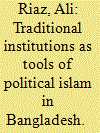

|
|
|
|
|
|
|
|